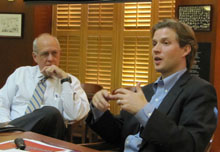Event
Alec Ross traces technology’s impact on open/closed societies

November 1, 2010 — In his Shorenstein Center discussion, “Twenty-first Century Statecraft,” Alec Ross, Senior Advisor for Innovation in the Office of Secretary of State Hillary Clinton, sketched the impact of technology on the historical tension between open and closed societies.
Ross said there is a “contest buried within” every historical society: “the struggle between open and closed societies” — those that encourage dissent and the free flow of information as opposed to those in which “economic prosperity is confined to the elite, religious and cultural norms are enforced and democracy is not observed.”
Looking at the “diffusion of information over communications networks,” Ross pointed out three modern entities that have seen dramatic transitions in the last hundred years: infrastructure (trains, highways), mass media (radio, television), and communications (telegraph, telephone, broadband networks), all of which are “driving toward a common platform.”
The first open society, Ross explained, was 300 B.C. Alexandria, where modern mathematics, science and medicine have roots. The society allowed for “dissent in academic engagement,” and fostered collaborative academic study. But “nothing opened society more than creating the printing press in 1441,” Ross said. It saw the rise of the state over theocracy, the rise of the Protestant Reformation and the rise of general political dissent. With this new openness came “centuries of litigation” over allowing the free flow of information versus cracking down against it. These are “not new dynamics that are playing out today,” said Ross.
Ross warned against “being utopian” and “naïve” about the power of technology. While Kenya and India have benefited greatly from technological advances, throughout the world technology can be used by “malignant forces as easily as good.” Citing an example of how technology can be used for good, Ross explained that when the emergency response systems in Haiti were destroyed in the 2010 earthquake, his office was able to set up an SMS system to facilitate communication and delivery of aid.
It is an “implicitly American value to foster openness,” Ross concluded, and since the issue of technology is “not tagged as Republican or Democrat, both sides of the aisle are supportive.”
This article was written by Janell Sims and the photos taken by Leighton Walter Kille, both of the Shorenstein Center.